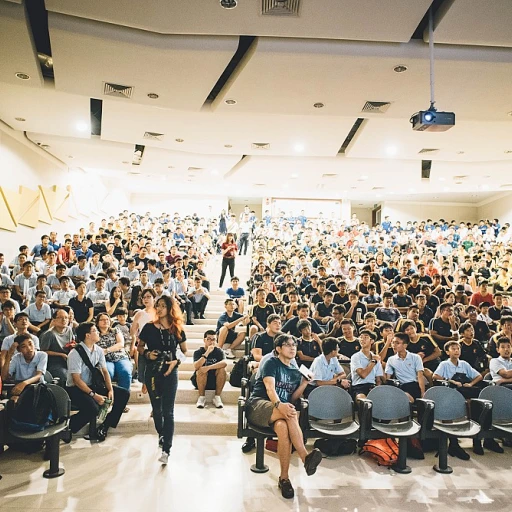
Understanding AI Automation in HR
Exploring the Role of AI in HR Automation
In the ever-evolving landscape of human resources, AI automation is emerging as a transformative force. This technology is reshaping how companies approach their HR functions, offering new opportunities for efficiency and effectiveness. By integrating artificial intelligence into HR processes, businesses can harness data-driven insights to enhance decision-making and streamline operations.
AI automation in HR is not just about replacing manual tasks with technology. It's about leveraging advanced tools to provide solutions that enhance the overall employee experience. Consulting firms are increasingly using AI to offer personalized consulting services, helping clients navigate complex HR challenges with precision and agility.
AI's Impact on HR Decision-Making
One of the most significant benefits of AI in HR is its ability to provide actionable insights. Through predictive analytics and real-time data analysis, AI systems can help HR professionals make informed decisions that align with business goals. This data-driven approach enables companies to identify trends, anticipate challenges, and implement effective change management strategies.
Consultants help businesses by utilizing AI tools to conduct thorough data analysis, offering insights that drive strategic planning and problem-solving. The consulting industry is witnessing a shift towards AI-driven solutions, where machine learning and natural language processing play crucial roles in understanding and addressing client needs.
Transforming Administrative Tasks
AI automation is also revolutionizing administrative tasks within HR departments. By automating routine processes, companies can save time and resources, allowing HR professionals to focus on more strategic initiatives. This shift not only improves efficiency but also enhances the overall effectiveness of HR functions.
As businesses continue to explore the potential of AI in HR, the focus is on developing systems that are both efficient and ethical. The integration of AI into HR processes requires careful consideration of ethical implications, ensuring that technology is used responsibly and transparently.
AI-Driven Insights for Enhanced Decision-Making
Enhancing Decision-Making Through AI Insights
The potential of AI-driven insights for decision making in human resources is immense. Consulting firms and businesses are utilizing predictive analytics and data analysis to harness these insights effectively. AI technology provides real-time data and deep learning capabilities that can transform how decisions are made, allowing companies to navigate complex challenges with agility.
Consultants help firms capitalize on these insights by leveraging advanced data analysis tools. By employing machine learning and artificial intelligence systems, consulting services offer solutions that are not only efficient but also data driven. This shift towards AI-enhanced decision making is a significant milestone in the consulting industry, pushing businesses towards a new era of strategic problem solving.
As firms strive for digital transformation, AI becomes instrumental in interpreting vast amounts of data across various human resources functions. With natural language processing technologies, consultants can provide businesses with detailed case studies and recommendations that are tailored to specific client needs. Companies that embrace these tools find themselves well positioned for both short-term success and long-term growth.
AI-driven insights empower clients to make informed management decisions, fostering a culture of continuous improvement. This transformation also highlights the evolving landscape of HR where consulting firms play a critical role in change management. The seamless integration of AI tools into everyday business processes also underscores how consulting can guide organizations in adapting to innovative solutions.
To explore how AI can pave the way for growth in HR innovation, further insights can be found here.
Streamlining Administrative Tasks
Optimizing Administrative Tasks with AI
AI automation is playing a pivotal role in the transformation of everyday administrative tasks within human resources. With the integration of advanced technology, consulting firms are finding innovative solutions to reduce inefficiencies and focus more on strategic activities. For companies, especially those in management consulting, time is a precious resource. The deployment of AI-driven tools is pivotal for real-time data processing and streamlining workloads. By harnessing the potential of machine learning and data analysis, businesses can now automate repetitive tasks such as payroll, scheduling, and record keeping. These changes not only increase efficiency but also enable HR professionals to direct their energy towards more impactful decision-making and consultancy services. Consultants are utilizing systems powered by AI to swiftly handle queries and improve the client experience. Human resources departments can leverage artificial intelligence for seamless communication through natural language processing. This helps in swiftly interpreting and responding to human inquiries, which enhances client management and support. Moreover, the consulting industry is witnessing a significant transition with data-driven decision making. Predictive analytics provide firms with the potential to anticipate trends and streamline their forecasting activities. In turn, this enables businesses to offer more robust consulting solutions and foster long-term client engagements. In revolutionizing human resources, effective change management facilitated by AI automation establishes a competitive edge and drives sustainable growth. Companies intentioned on digital transformation are increasingly looking to adopt these transformative technologies to optimize their administrative functionalities and focus on strategic growth.Personalized Coaching Through AI
Transforming Coaching with AI-Driven Personalization
In today's competitive business environment, consulting firms are continually seeking innovative solutions to outpace their competitors. Personalized coaching, powered by artificial intelligence, is reshaping the landscape of human resources consulting by leveraging data-driven insights to enhance the effectiveness of traditional coaching methods. AI technologies enable consultants to offer tailor-made coaching experiences by analyzing vast amounts of data in real time. Through machine learning and natural language processing, businesses can gather valuable insights into their employees' strengths, weaknesses, and potential areas for growth. This analysis helps consultants curate personalized development plans that align with the unique needs and goals of each client. Moreover, AI-driven tools can monitor progress and provide ongoing feedback, enabling consultants to offer continuous, adaptive solutions. By utilizing predictive analytics, consulting services can anticipate potential obstacles and suggest actionable strategies, ensuring long-term success for their clients. This proactive approach not only improves decision making but also fosters a culture of continuous improvement within companies. While the benefits of AI in coaching are evident, businesses must remain mindful of the ethical considerations and challenges associated with increased reliance on technology. Trust and transparency are crucial as human-centric data analysis becomes more prevalent in guiding consulting strategies. Maintaining an ethical balance ensures that both the consultancy industry and its clients can embrace digital transformation confidently. In summary, AI's integration into personalized coaching offers a transformative approach to consulting. By harnessing technology for tailored development, consulting firms can better meet the diverse needs of their clients, offering impactful, data-driven solutions that pave the way for future success.Challenges and Ethical Considerations
Addressing Ethical Dilemmas in AI-Driven HR
The integration of artificial intelligence in human resources, while transformative, brings forth a series of ethical challenges that businesses must navigate. As consulting firms and companies increasingly rely on data-driven insights for decision making, the potential for bias and discrimination in AI systems becomes a significant concern. Machine learning algorithms, if not carefully managed, can inadvertently perpetuate existing biases present in historical data, leading to unfair outcomes in hiring and employee evaluations.
Balancing Privacy and Data Utilization
Another critical issue is the balance between utilizing data for business insights and respecting employee privacy. Consulting services that leverage AI tools must ensure that data analysis does not infringe on personal privacy. This requires transparent data management practices and clear communication with clients about how their data will be used. Companies need to implement robust data protection measures to maintain trust and comply with regulations.
Ensuring Transparency and Accountability
Transparency in AI-driven solutions is essential for maintaining trust in the consulting industry. Clients and businesses need to understand how AI tools arrive at their conclusions. This transparency is crucial for accountability, allowing firms to explain and justify decisions made by AI systems. Consulting firms must work closely with clients to ensure that AI applications align with ethical standards and business values.
Preparing for Long-Term Implications
As AI continues to evolve, consulting firms must prepare for its long-term implications on the workforce. Change management strategies will be essential in helping businesses adapt to new technologies. Consultants help companies navigate these changes by providing insights into potential impacts on employment and organizational structure. By focusing on ethical considerations and responsible AI use, firms can foster a culture of innovation that prioritizes human-centric solutions.













